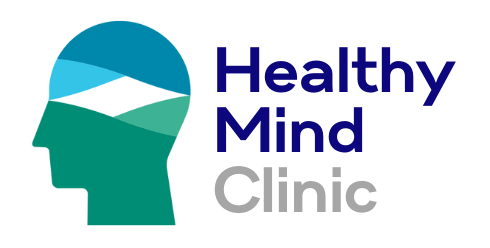Psychologist Sydney CBD

Clinical Psychologist in Sydney
How Healthy Mind Clinic Can Help
Our clinical psychologists can help you with a range of needs. We provide assistance and treatment to people in the following areas:
Anxiety
Anxiety is common, but usually not a problem when it’s brief and comes on at the right time. It’s caused by the body’s fight-flight-freeze system being triggered by a threatening situation. While it can feel unpleasant, it serves to keep people safe and to respond helpfully when faced with an actual threat to life or safety. It’s made of a combination of thoughts (often worries about negative future events, other peoples’ opinions, particular situations or other concerns), physical sensations and urges to avoid certain situations.
For some people anxiety can be challenging when it’s constant, draining or excessive. In some cases, that level of anxiety may be an anxiety disorder. This is a common condition in which anxiety feels distressing and affects daily life. About 25% of Australians will experience an anxiety disorder at some point in their life.
Common types of anxiety include:
- Social anxiety – concern about being judged negatively by others in social situations
- Generalised anxiety – excessive worry that is hard to control
- Health anxiety – concern about having or developing a serious health condition
- Panic – concern about having a panic attack, losing control, having a heart attack or going crazy
- Obsessive-Compulsive Disorder (OCD) – intrusive, repetitive concerns that prompt people to use particular neutralising behaviours (often repetitive)
- Specific phobia – anxiety about specific objects or situations (such as animals, needles and injections, heights, enclosed spaces among others)
Problems with anxiety are treatable. Based in the Sydney CBD, we specialise in providing treatment for anxiety that is tailored to your needs and circumstances.
Depression and Mood Problems
It’s common to experience times of sadness and varying mood. When the sadness feels constant and lasts for two or more weeks, it may be a sign of depression (or Major Depressive Disorder). Approximately 1 in 4 people experience an episode of depression in their lifetime. In addition to sadness, other signs of depression include not enjoying usually enjoyable activities, sleep problems, thoughts of suicide, low energy, changes in appetite and weight, reduced sex drive and reduced hopefulness.
Sometimes, in addition to periods of depressed mood, people can experience unusually high moods. If this lasts for several days and is accompanied by other changes, it might be a sign of mania and bipolar mood variation. These other changes can include feeling much more energetic than usual, feeling much less need for sleep, feeling wired and unusual, increased irritability and distractibility, doing things more impulsively, trying to do lots of things at once and feeling unusually productive, taking more risks than usual (for example with money, sex or physical risk-taking), drinking more alcohol and using substances. Sometimes it can also include believing things people wouldn’t usually believe or a sense of having unusual experiences.
Click here to learn more about how we can help you with treatment for depression and other mood problems.
Trauma and PTSD
Post-traumatic stress disorder (PTSD) can follow experiencing an event that significantly threatens a person’s life or physical safety. This may be either experiencing the event directly, witnessing it, or learning that it happened to somebody close. Signs of PTSD can include any of the following that lasts for at least one month: distressing unwanted thoughts or dreams about what happened, having strong distressing reactions at reminders, avoiding situations, people or conversations about what happened, low mood and negative thoughts, feeling anxious and agitated, and having difficulty winding down. PTSD is common, affecting up to approximately 10% of people. The experience of trauma may also be associated with other difficulties including depression, problematic alcohol and substance use and anxiety disorders.
Our Sydney clinical psychologists specialise in treating PTSD and other difficulties associated with trauma. Click here for more information.
Work and Life Stress
Everyone goes through times of life stress. While people may be able to cope most of the time, sometimes things can get on top of us and feel overwhelming. This can be from problems at work, relationships, illness, family difficulty or life changes (for example, work change or relocation). Some of the difficulties people experience at these times can include difficulties with mood, anger, worry and anxiety, sleep, or feeling more emotional than usual.
Treatment By Sydney Based Psychologist
Sydney Psychologist – Based in Sydney’s CBD, we specialise in providing treatment for anxiety, depression and mood problems, trauma and PTSD, and work and life stress. We have expertise in helping people build skills in a personalised way to enhance their coping ability. We typically use cognitive behavioural therapy (CBT) to help people as it is one of the most effective approaches to better handle anxiety, depression, traumatic stress and other life and emotional concerns. This is a practical approach that teaches skills to handle the negative thoughts, situations and behaviour that unintentionally maintain emotional difficulties. We often complement this with mindfulness-based and self-care approaches. Combining medication with CBT can also be helpful at times. We encourage people to speak to their GP or other doctor about whether medication is suitable, what to expect when using medication and how best to use it.
Psychologist in Sydney CBD
Treatment
Based in Sydney’s CBD, we specialise in providing treatment for anxiety, depression and mood problems, trauma and PTSD, and work and life stress. We have expertise in helping people build skills in a personalised way to enhance their coping ability. We typically use cognitive behavioural therapy (CBT) to help people as it is one of the most effective approaches to better handle anxiety, depression, traumatic stress and other life and emotional concerns. This is a practical approach that teaches skills to handle the negative thoughts, situations and behaviour that unintentionally maintain emotional difficulties. We often compliment this with mindfulness-based and self-care approaches. Combining medication with CBT can also be helpful at times. We encourage people to speak to their GP or other doctor about whether medication is suitable, what to expect when using medication and how best to use it.
We are available to meet with people in our Sydney office. We are also available to meet by phone and video so we are also able to help people elsewhere in Australia and internationally. We aim to understand your specific concerns, needs and goals, then work collaboratively with you to teach you practical skills supported by science to help improve how you feel. If you are looking to learn helpful practical skills to improve how you feel, provided in an empathic warm environment, we would welcome working with you. Please be in touch.
Anxiety
Anxiety is common, but usually not a problem when it’s brief and comes on at the right time. It’s caused by the body’s fight-flight-freeze system being triggered by a threatening situation. While it can feel unpleasant, it serves to keep people safe and to respond helpfully when faced with an actual threat to life or safety. It’s made of a combination of thoughts (often worries about negative future events, other peoples’ opinions, particular situations or other concerns), physical sensations and urges to avoid certain situations.
For some people anxiety can be challenging when it’s constant, draining or excessive. In some cases, that level of anxiety may be an anxiety disorder. This is a common condition in which anxiety feels distressing and affects daily life. About 25% of Australians will experience an anxiety disorder at some point in their life.
Common types of anxiety include:
- Social anxiety – concern about being judged negatively by others in social situations
- Generalised anxiety – excessive worry that is hard to control
- Health anxiety – concern about having or developing a serious health condition
- Panic – concern about having a panic attack, losing control, having a heart attack or going crazy
- Obsessive-Compulsive Disorder (OCD) – intrusive, repetitive concerns that prompt people to use particular neutralising behaviours (often repetitive)
- Specific phobia – anxiety about specific objects or situations (such as animals, needles and injections, heights, enclosed spaces among others)
Problems with anxiety are treatable. Based in the Sydney CBD, we specialise in providing treatment for anxiety that is tailored to your needs and circumstances.
Depression and Mood Problems
It’s common to experience times of sadness and varying mood. When the sadness feels constant and lasts for two or more weeks, it may be a sign of depression (or Major Depressive Disorder). Approximately 1 in 4 people experience an episode of depression in their lifetime. In addition to sadness, other signs of depression include not enjoying usually enjoyable activities, sleep problems, thoughts of suicide, low energy, changes in appetite and weight, reduced sex drive and reduced hopefulness.
Sometimes, in addition to periods of depressed mood, people can experience unusually high moods. If this lasts for several days and is accompanied by other changes, it might be a sign of mania and bipolar mood variation. These other changes can include feeling much more energetic than usual, feeling much less need for sleep, feeling wired and unusual, increased irritability and distractibility, doing things more impulsively, trying to do lots of things at once and feeling unusually productive, taking more risks than usual (for example with money, sex or physical risk-taking), drinking more alcohol and using substances. Sometimes it can also include believing things people wouldn’t usually believe or a sense of having unusual experiences.
Click here to learn more about how we can help you with treatment for depression and other mood problems.
Trauma and PTSD
Post-traumatic stress disorder (PTSD) can follow experiencing an event that significantly threatens a person’s life or physical safety. This may be either experiencing the event directly, witnessing it, or learning that it happened to somebody close. Signs of PTSD can include any of the following that lasts for at least one month: distressing unwanted thoughts or dreams about what happened, having strong distressing reactions at reminders, avoiding situations, people or conversations about what happened, low mood and negative thoughts, feeling anxious and agitated, and having difficulty winding down. PTSD is common, affecting up to approximately 10% of people. The experience of trauma may also be associated with other difficulties including depression, problematic alcohol and substance use and anxiety disorders.
Our Sydney clinical psychologists specialise in treating PTSD and other difficulties associated with trauma. Click here for more information.
Work and Life Stress
Everyone goes through times of life stress. While people may be able to cope most of the time, sometimes things can get on top of us and feel overwhelming. This can be from problems at work, relationships, illness, family difficulty or life changes (for example, work change or relocation). Some of the difficulties people experience at these times can include difficulties with mood, anger, worry and anxiety, sleep, or feeling more emotional than usual.
Treatment
Based in Sydney’s CBD, we specialise in providing treatment for anxiety, depression and mood problems, trauma and PTSD, and work and life stress. We have expertise in helping people build skills in a personalised way to enhance their coping ability. We typically use cognitive behavioural therapy (CBT) to help people as it is one of the most effective approaches to better handle anxiety, depression, traumatic stress and other life and emotional concerns. This is a practical approach that teaches skills to handle the negative thoughts, situations and behaviour that unintentionally maintain emotional difficulties. We often compliment this with mindfulness-based and self-care approaches. Combining medication with CBT can also be helpful at times. We encourage people to speak to their GP or other doctor about whether medication is suitable, what to expect when using medication and how best to use it.
We are available to meet with people in our Sydney office. We are also available to meet by phone and video so we are also able to help people elsewhere in Australia and internationally. We aim to understand your specific concerns, needs and goals, then work collaboratively with you to teach you practical skills supported by science to help improve how you feel. If you are looking to learn helpful practical skills to improve how you feel, provided in an empathic warm environment, we would welcome working with you. Please be in touch.
Who we are

Dr Adrian Allen
Principal Clinical Psychologist
Who we are
Adrian has extensive experience supporting people with treatment for difficulties with anxiety, mood and other emotional and life concerns. His research into anxiety is published in international peer-reviewed scientific journals.

Our Approach
We specialise in delivering evidence-based clinical psychological services. We use cognitive behavioural therapy (CBT) and associated approaches. We work with people to understand what has prompted their concerns, what maintains them and importantly, we teach people the skills they need to overcome them.
What we provide
Qualifications & experience
Our clinicians hold advanced qualifications in clinical psychology, are fully endorsed to practice as clinical psychologists and have several years experience in both private practice and in major hospital specialty treatment units.
Treatment supported by science
We use interventions that have been shown as helpful in scientific research to help with anxiety, mood problems and other emotional difficulties.
Flexibility
We offer appointments in person, by video call and by phone.
